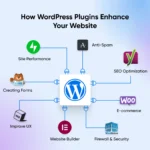The Ultimate Guide to WordPress: Powering the Web with Flexibility and Innovation

WordPress has established itself as the most popular content management system (CMS) in the world, powering over 40% of all websites. Its flexibility, scalability, and vast plugin ecosystem make it an excellent choice for bloggers, businesses, and eCommerce platforms. Whether you’re a beginner or an experienced developer, WordPress offers limitless possibilities.
1. Why Choose WordPress?
WordPress provides an intuitive interface, making website creation accessible to everyone, from non-tech users to expert developers. Here’s why it remains the preferred CMS:
- Open-Source & Free: WordPress is open-source software, allowing developers worldwide to contribute and enhance its functionality.
- User-Friendly Interface: No coding skills? No problem! WordPress has an easy-to-use dashboard for managing content.
- SEO-Friendly: Built-in SEO features and powerful plugins help websites rank higher in search engines.
- Customization: Thousands of themes and plugins allow for complete customization.
- Security & Performance: Frequent updates, security plugins, and optimization tools keep WordPress sites safe and fast.
2. WordPress.com vs. WordPress.org
Many beginners get confused between WordPress.com and WordPress.org. Here’s the key difference:
- WordPress.com is a hosted platform with limited customization unless you purchase premium plans.
- WordPress.org is self-hosted, providing full control over your site, themes, and plugins. It’s ideal for businesses and serious bloggers.
For complete freedom and customization, WordPress.org is the best choice.
3. Getting Started with WordPress
Step 1: Choose a Domain Name & Hosting
Selecting a strong domain name that represents your brand is crucial. Popular hosting providers for WordPress include:
- Bluehost
- SiteGround
- Kinsta
- WP Engine
Step 2: Install WordPress
Most hosting providers offer one-click WordPress installation, making setup effortless.
Step 3: Pick a Theme
Your website’s design depends on the theme you choose. Some top free and premium themes include:
- Astra (lightweight and fast)
- OceanWP (highly customizable)
- GeneratePress (SEO-optimized)
- Divi (drag-and-drop builder)
- Avada (multipurpose)
Step 4: Install Essential Plugins
Plugins add extra functionality to your site. Here are some must-have ones:
- SEO: Yoast SEO, Rank Math
- Security: Wordfence, Sucuri
- Performance: WP Rocket, LiteSpeed Cache
- E-Commerce: WooCommerce
- Forms: WPForms, Gravity Forms
- Backup & Restore: UpdraftPlus
4. WordPress for Blogging
WordPress started as a blogging platform and remains the best choice for bloggers. Key features include:
- Categories & Tags: Organize posts efficiently.
- Gutenberg Editor: Drag-and-drop interface for creating visually appealing posts.
- Monetization: Integrate ads, affiliate marketing, and memberships.
5. WordPress for Business Websites
WordPress is ideal for business websites, offering features such as:
- Custom Contact Forms
- Appointment Booking Systems
- CRM Integrations
- Membership Portals
6. WordPress for E-Commerce
With WooCommerce, WordPress transforms into a full-fledged eCommerce platform. Features include:
- Product Management
- Secure Payments (PayPal, Stripe, etc.)
- Inventory Tracking
- Subscription & Membership Models
7. WordPress Security Best Practices
Keeping your WordPress site secure is essential. Follow these security tips:
- Use Strong Passwords & Two-Factor Authentication
- Regularly Update WordPress, Themes, and Plugins
- Install a Security Plugin (Wordfence, Sucuri, iThemes Security)
- Use SSL Certificates
8. Optimizing WordPress for Speed
A slow website can hurt user experience and rankings. Optimize your WordPress site by:
- Using a Lightweight Theme
- Installing Caching Plugins
- Optimizing Images with Smush or ShortPixel
- Using a Content Delivery Network (CDN)
9. Future of WordPress
With regular updates, Gutenberg block enhancements, AI-powered automation, and improved security features, WordPress continues to lead the CMS industry. The future includes more seamless integrations, better AI-driven tools, and an even more intuitive editing experience.
Conclusion
WordPress remains the best CMS for creating websites, whether for blogs, businesses, or online stores. With a vast plugin ecosystem, unparalleled flexibility, and continuous improvements, it is the perfect solution for anyone looking to establish an online presence.









